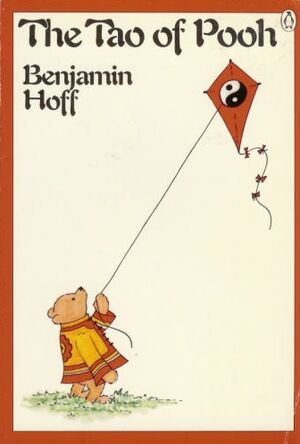
The Tao of Pooh
- "One of the most important principles of Taoism was named after you... P'u, the Uncarved Block."
- —Benjamin Hoff
The Tao of Pooh is a fiction theology book written by Benjamin Hoff, illustrated by Ernest H. Shepard, the illustrator of the original Winnie the Pooh storybooks. It was followed by The Te of Piglet in 1992. The book examines the life of Pooh and shows how it can be used as a model for the eastern Asian concept of Taoism. It was published originally in 1982, ISBN 0-525-24458-1.
The book takes characters from the original Pooh storybooks, as well as excerpts from those books, and uses them to demonstrate the principles and ideals of Taoism. Many segments are presented as conversations between the author of the book and the characters. The book was on the New York Times bestseller list for 49 weeks and is used as required reading in some college courses.
Table of Contents[]
- Foreword (p. X)
- The How of Pooh? (p. 1)
- The Tao of Who? (p. 9)
- Spelling Tuesday (p. 23)
- Cottleston Pie (p. 37)
- The Pooh Way (p. 67)
- Bisy Backson (p. 91)
- That Sort of Bear (p. 115)
- Nowhere and Nothing (p. 141)
- The Now of Pooh (p. 153)
- Backword (p. 157)
Notable and Quotable[]
- "What Chuang-tse, Christopher Robin, and Pooh are describing is the Great Secret, the key that unlocks the doors of wisdom, happiness, and truth. What is that magic, mysterious something? Nothing. To the Taoist, Nothing is something, and Something-- at least the sort of thing that many consider to be important--is really nothing at all."
- "Our Busy Backson religions, sciences, and business ethics have tried their hardest to convince us that there is a Great Reward waiting for us somewhere, and that what we have to do is spend our lives working like lunatics to catch up with it. Whether it's up in the sky, behind the next molecule, or in the executive suite, it's somehow always farther along than we are--just down the road, on the other side of the world, past the moon, beyond the stars..."
- "From the state of the Uncarved Block comes the ability to enjoy the simple and the quiet, the natural and the plain. Along with that comes the ability to do things spontaneously and have them work, odd as that may appear to others at times."